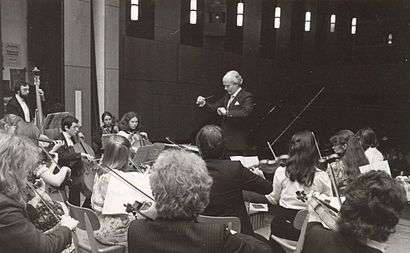Walter Blankenheim
Walter Blankenheim (30 August 1926 – 11 March 2007) was a German pianist and teacher. He studied at the Musikhochschule Stuttgart (1946–1954) with Jürgen Uhde and Vladimir Horbowski and later in Paris with Marguerite Long. Further studies included courses with Geza Anda and Wilhelm Kempff. He won prizes in a number of competitions, including: Vercelli 1952 (2nd Prize), München - ARD 1952 and 1953 (Diplomas), Paris 1953 (Diploma), Casella 1954 (1st Prize). He was renowned for his interpretations of W. A. Mozart und J. S. Bach, and he toured extensively as a recitalist and concerto soloist for over 50 years, performing in West Europe, Russia, the near and far East, United States and Latin America. He recorded works from the Baroque to the 20th Century with different radio stations, such as Saarland Radio (Saarländischer Rundfunk) in Germany. Recently, some of his recordings (such as the 1996 recording of the Six Partitas BWV 825–830) are being re-released. Walter Blankenheim had an active teaching career, being a professor of piano at the Hochschule für Musik Saar (Conservatorium of Music in Saarbrücken), while his masterclasses on Bach interpretation took him to a number of countries. He was also frequently invited to be on the jury of piano competitions.

Contribution
Well known in his time for his interpretations of the music of W. A. Mozart and J. S. Bach, and his pedagogical activity (in particular his courses devoted to Bach Interpretation), he is now remembered as the founder of the International Piano Competition “Johann Sebastian Bach” Würzburg / Germany. The competition was founded in 1990 and took place for the first time in 1992. It was initially held in Saarbrücken, Germany, (it is now held in Würzburg, Germany).[1] The competition has been held every three years since, and with 771 Pianists from a total of 58 Countries registering to a total of 9 Competitions (the 9th Competition was held in March 2016), it is considered the largest Bach Piano Competition in the World, and the only International Bach Competition where the repertoire consists of only the works of J. S. Bach.[2][3][4]
His contribution to Bach interpretation was the development of a system of interpreting Bach’s keyboard works on the modern piano, processing the neutral Urtext of the works in order to help the performer understand and convey parameters such as tempo, structure, articulation, ornaments, dynamics as well as the architecture of the work, portraying a "living structure" and a balance between "energy and relaxation".[5] Walter Blankenheim wrote an essay exploring these ideas, titled: "Problems and Chances in the interpretation of J. S. Bach’s keyboard works on the modern piano"[6]
References
- ↑ Alink, Gustav. "Walter Blankenheim passed away". Alink-Argerich Foundation. Retrieved 14 June 2016.
- ↑ "Wettstreit der Pianisten in Würzburg". MAIN POST. MAIN POST. 24 March 2007. Retrieved 14 June 2016.
- ↑ PPREISSNER, KATJA (10 July 2000). "Bach-Spiel ohne Schallmauer" (NR. 157 MONTAG, 10. JULY 2000). Saarbrücker Zeitung. Saarbrücker Zeitung. Retrieved 14 June 2016.
- ↑ "Im Fernen Osten ist Bach besonders beliebt". Saarbrücker Zeitung. Saarbrücker Zeitung. 26 February 2004. Retrieved 14 June 2016.
- ↑ Anderson, Richard Paul (2012). The Pianist's Craft Mastering the works of Great Composers. Plymouth, UK: The Scarecrow Press, INC. pp. 13–15. ISBN 978-0-8108-8205-8.
- ↑ Vorwort zu den Bachtagen, Saarland 1997